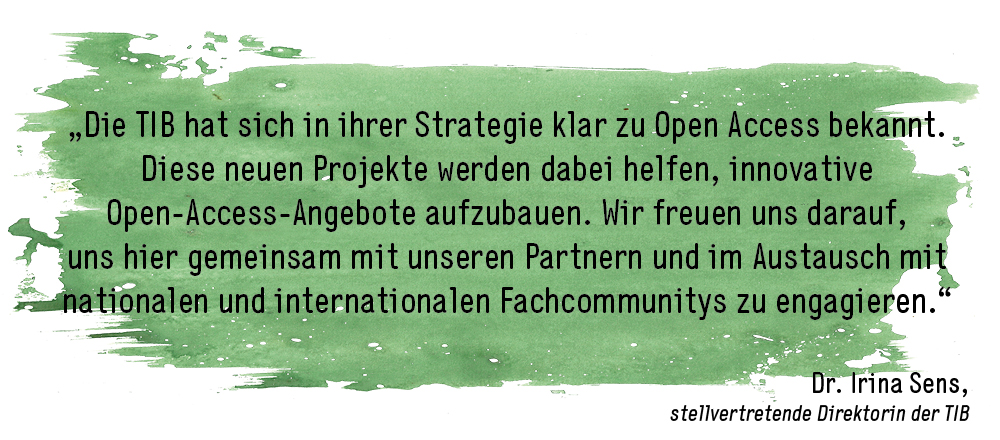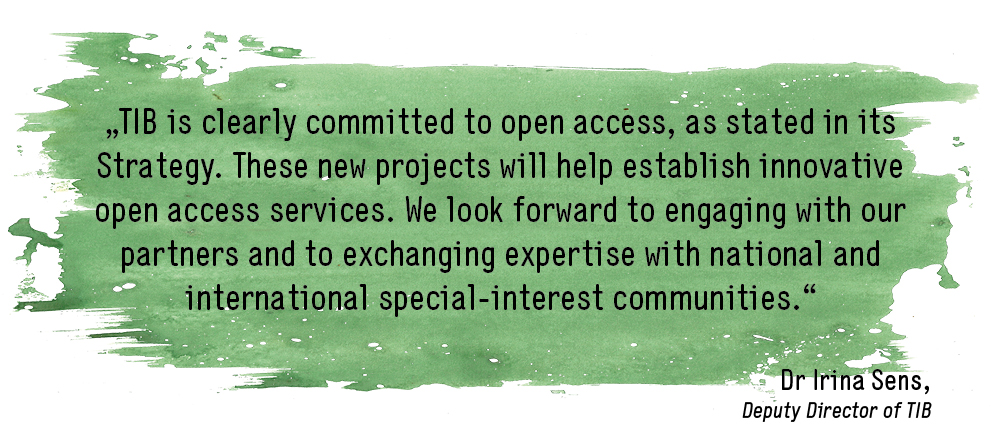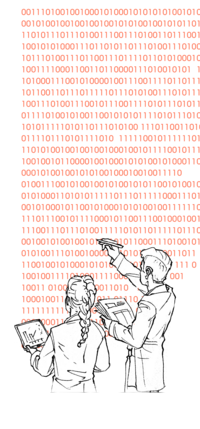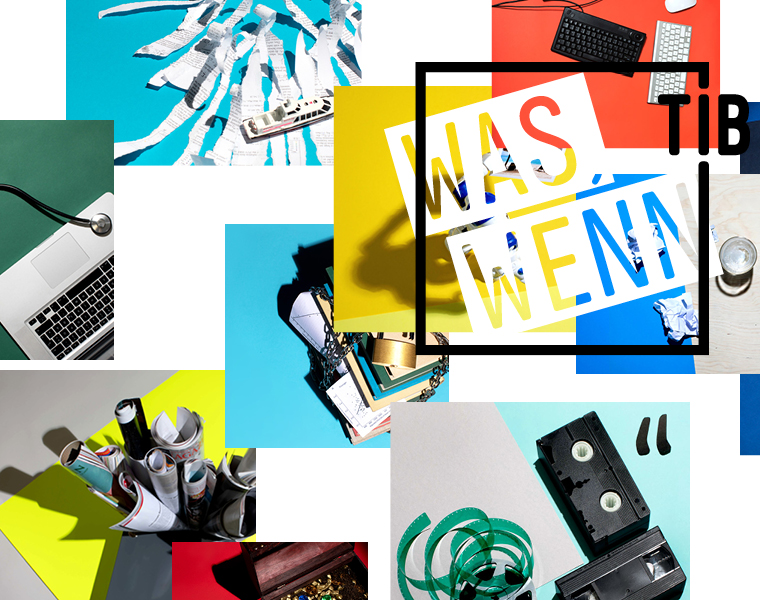![[Translate to Englisch:] [Translate to Englisch:]](/fileadmin/_processed_/7/e/csm_ueber-uns_cff8b0e430.jpg)
TIB → You started training to become a bookbinder 44 years ago, and for the last twelve years you have been head of TIB’s bookbindery, where you now train others to become bookbinders. How much has changed in your occupation and the tasks involved over time?
Thiele → Our task of protecting and preserving the library’s collections by rebinding and repairing books has not changed to this day. The working methods have also remained the same. But over the years, of course, the machines have been modernised and made safer. At TIB, we are at the cutting edge of technology, and have always been able to adapt our machines and equipment to meet requirements. The cutting machine has a touch display; cutting programmes can be accessed directly. We no longer write shelf marks on a typewriter, as was the case in the past: the barcode is scanned, processed on the computer, and then printed out by a thermal transfer printer.
What has definitely changed are the materials. Some pasting papers are no longer produced nowadays, and what was once an extensive choice of colours has now shrunk to just three: black, grey and beige. These days, the text paper is coated so that the pages of a book do not absorb liquids so quickly – essentially, a good attribute. But it makes our work more difficult: the glue does not stick to the pages as well. For most books, we now have to roughen the spine to increase the surface area so that the glue adheres better and can hold the pages in place. Despite these changes, the everyday life of a contemporary craft bookbinder is still comparable to that of 100 years ago.
Open access, free access to scientific and scholarly publications, is a requirement for fast scientific progress. Most researchers, scientific institutions and funding agencies agree that open access should be the normal state of scholarly publishing. But there is still a long way to go. To build sustained momentum, the Federal Ministry of Education and Research (BMBF) is funding projects to speed up the transformation to open access.
Three undertakings submitted by TIB and various partners have now received BMBF funding to help bring about a shift in publishing: B!SON, a recommendation service for quality-assured open access journals; the KOALA project for collaborative solutions for financing open access; and OPTIMETA, which is dedicated to strengthening the open access publishing system by integrating open citations and geospatial data.



Data is produced in all academic disciplines – through surveys, experiments, measurements or the analysis of historical sources. Research data can take many different forms: tables, text documents, photos, videos and databases, to name but a few. Data is a valuable resource for science. After all, open and freely accessible data provides a wealth of information. Not only can data can be used by other researchers, it also makes research results transparent and reproducible, and saves a great deal of time, money and effort.
TIB has been involved in this field for years in an effort to define worldwide standards. One example is the allocation of Digital Object Identifiers (DOI), unique identifiers for research data. And this involvement has been highly successful. After all, just as users rely on the ISBN to identify books, the DOI is now relied on to identify research data and other digital objects.
This is precisely what TIB does in its new format “WAS, WENN ...?” (What if …?)
Brief introductions to several TIB topics are available at waswenn.tib.eu: from enhanced knowledge sharing through knowledge graphs, the importance of Big Data in medicine and the wealth of data in research, to the question of how digital data can be made accessible for the next thousand years.

TIB → Licences play a particularly important role for libraries. After all, besides being home to thousands of books on their shelves, libraries also have an increasing number of databases, electronic journals and electronic books in their collections. Could you tell us what these media have to do with the topic of licences?
Pöche → When you purchase a printed book or journal, there are clear rules about what a library can do with these items. This is not the case with electronic media, for which libraries acquire rights of use. These rights must be defined and set out in a licence, i.e. an agreement between the rights holder – usually a publisher – and the library.
TIB → And what exactly are your and your colleagues’ tasks in this area, as well as those of TIB in general?
Pöche → Our task is to reach licensing agreements with commercial and society publishers. This involves obtaining offers, assessing costs in relation to the rights of use granted, checking contract drafts and, of course, continuously negotiating improvements. Given that we are not only a university library, but also a national specialised library, we have very specific needs regarding rights of use. Together with the sheer volume of content from multiple providers across the world, this is what makes licensing agreements so complex. Of course, Licence Management is not the only unit involved in this process. We work in close cooperation with various teams from the Acquisitions and Cataloguing Department.
TIB → Looking back, how has the importance of licences changed in day-to-day operations at the library? And, of even greater interest: How will their importance change in the years to come, and what impact will these developments have on the mission of TIB?
Pöche → Print is considered outdated, at least in the disciplines served by TIB. Nowadays, many providers offer electronic products only; customers want digital content, and TIB also has an e-preferred strategy. We have long moved on from the days when a digital version was issued as an add-on to a print copy. The acquisition process has become considerably more complicated, and greater demands are placed on staff. The delivery of content also increases in complexity. To ensure that all library users know what they are allowed to do with a particular electronic book or electronic version of a journal, the licence information, i.e. the rights of use, must be documented and communicated.
To draw another comparison with print items: If you buy 100 printed books, you can use all of them in the same way. But when you buy 100 electronic books and you are out of luck, you might end up with 100 different licence agreements with varying rights of use.
It is extremely exciting to look to the future. The transformation to Open Access has clearly gained momentum. The number of freely available journals, conference proceedings and books will steadily increase. As a result, the need for licences from publishers will decline again, but will likely not disappear altogether. Products that are not affected by the transformation to Open Access will continue to exist, especially certain types of databases; these types of products will still need to be licensed.
And even if the number of licence negotiations drops at some point, as long as commercial providers exist, there will be a need to negotiate with them – probably less frequently about licences, but instead about services in the publication process and how these are financed.
The transformation to Open Access, or rather the desired result of the process, does of course not only affect the area of licensing, but the entirety of TIB. The free availability of specialist information creates completely new needs among researchers, and TIB must respond to these needs with a stronger focus on services.
The Encyclopaedia Cinematographica includes approximately 2,000 scientific ethnological films from the early 20th century to the 1980s that show cultural customs such as music and dance, religion and traditional healing, and much more besides. In addition to these films, the collection also includes extensive supplementary material: 300 file folders containing editorial and production files, supplementary publications in the form of more than 100 file folders, 3,500 loose-leaf booklets as well as photo archives with hundreds of photos, negatives and slides. “The supplementary materials are really quite something, given that they contain the making-of the films, i.e. essential information that helps us to understand the films better. Supplementary materials and films belong together, like two sides of the same coin,” explains Miriam Reiche, conservator and conservation coordinator at TIB.
Unfortunately, the ability to use the supplementary materials is very limited at present – the files are very fragile, having been stored inappropriately for decades, and can only be viewed under strict conditions. The Federal Government Commissioner for Culture and the Media is now funding a project that aims to protect the materials from further damage by repackaging them: the materials will be “demetallised” – paper clips and staples that damage the paper will be removed – and repackaged in archival-quality packaging. “This is the first step towards making these culturally and historically important materials accessible to researchers,” enthuses Thomas Bähr, Head of Preservation and Digital Preservation at TIB.
The films contained in the Encyclopaedia Cinematographica have already been digitised, and are available on TIB’s AV-Portal.
How do you calculate the oxygen content of water? How does the European Union work? These and many other questions are addressed in countless videos on various internet platforms, the most prominent of which is YouTube. And yet how do people use these educational videos? In the context of an interdisciplinary research project, scientists at the Leibniz-Institut für Wissensmedien (IWM), the German Institute for Adult Education (DIE) and TIB have gained first insights into when and why users of online video platforms push the pause button.
Using authentic video usage data from TIB’s AV-Portal, the researchers investigated when and, above all, why users pause educational videos. The outcome: at particularly complicated passages and between different content sequences. The study findings can be incorporated into the conceptual design of educational videos: by setting automatic pauses or inserting comprehension questions at suitable video sequences, complex content can be presented in a way that is easier for users to understand.